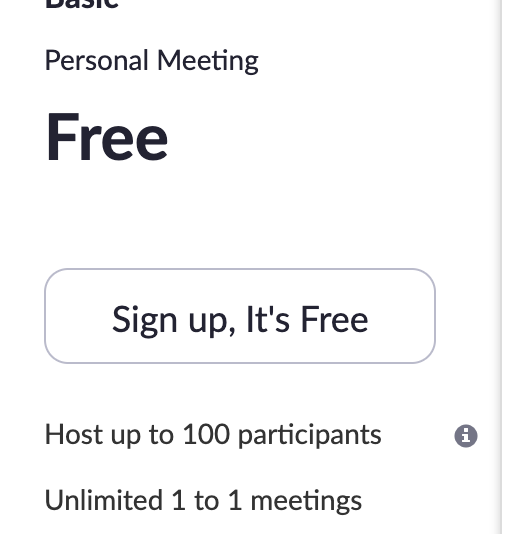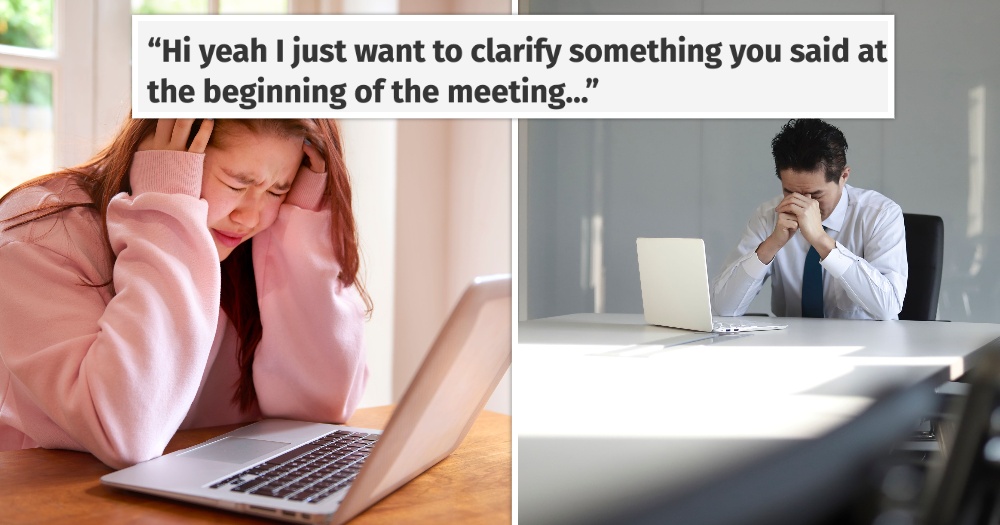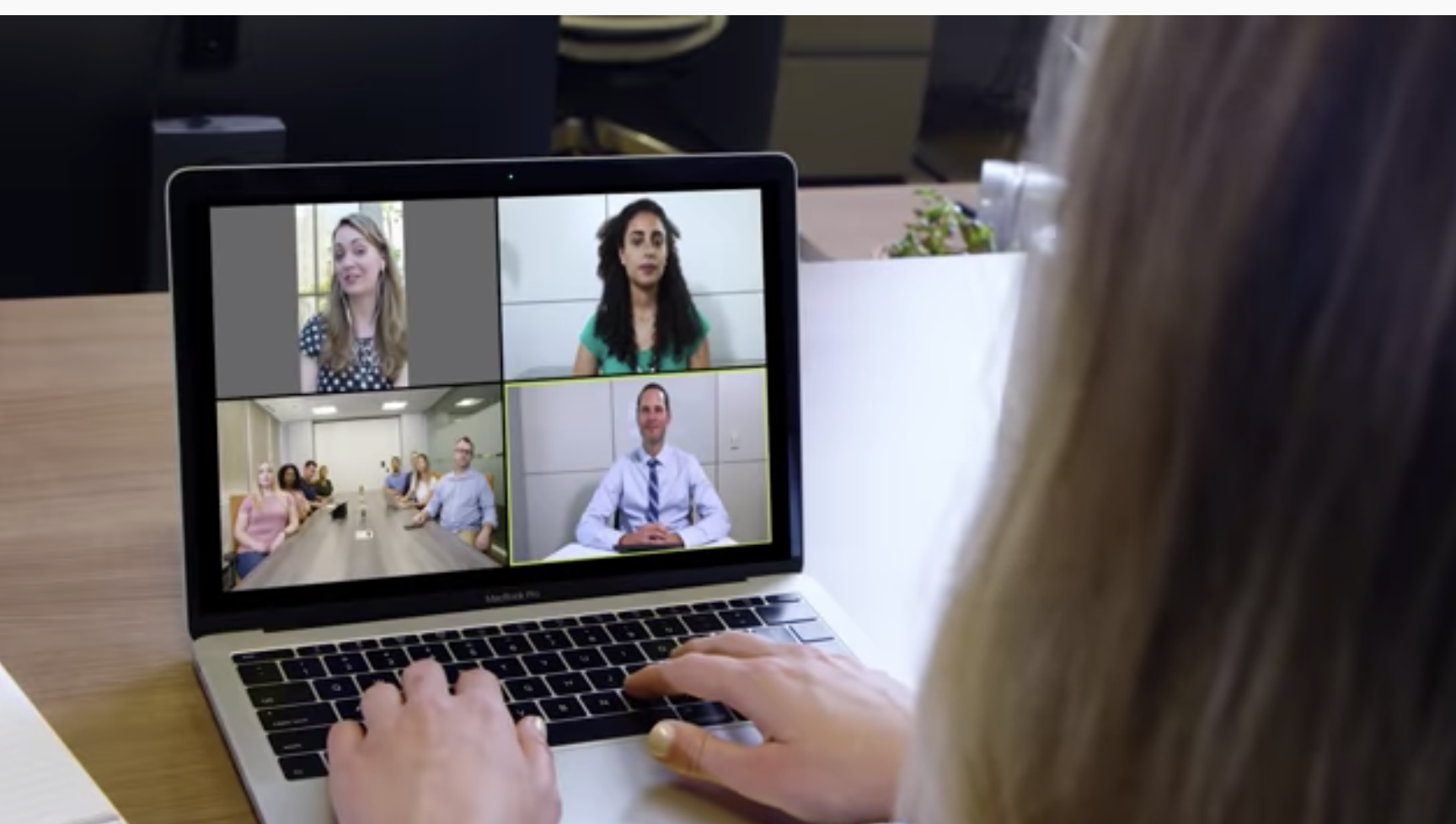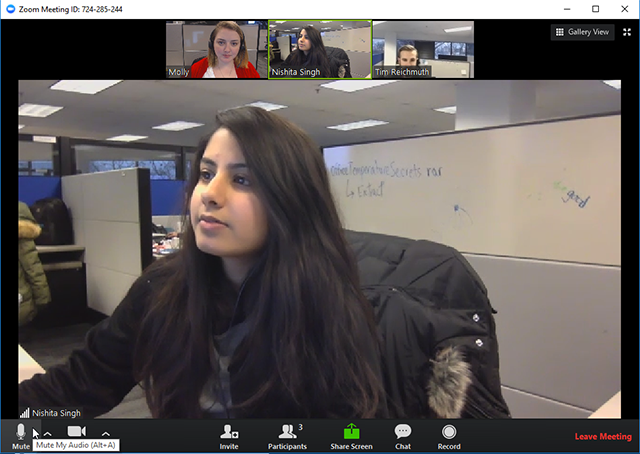COMMENTARY: Zoom conferences have become more common with more people working from home during the Covid-19 pandemic. But they come with their own set of problems.
If you have the privilege of working from home, you would probably have been in a few Zoom meetings by now.
Just in case you haven't, here's an example of the layout.
If there are a lot of people, most of the faces will be lined up on the top panel of your laptop screen, and one big screen displaying the main person who is speaking.
You can switch the layout, but a meeting with more people will usually look like this.
However, if there are more manageable numbers, the display is actually quite enjoyable and intuitive.
Chances are, due to the size of your company, your meeting will be neither enjoyable nor intuitive.
Pro-tip: If you are able to, right before the meeting starts, when the final person enters the meeting room, make your presence felt.
The latecomer will sometimes tries to justify their tardiness:
"Oh so sorry, my father slipped and cracked his..."
It is imperative to cut the person off, lest the others realise the difference in timing between the last person and the second-last person (you) is only about six to seven seconds.
"Eh don't worry about it (insert last name of last person here), let's just get started with the meeting."
The person in charge will then start the meeting. This is where your attempt at cutting off the latecomer and trying to start the convo rolling pays off.
"Thanks (your name), yup, let's start the meeting."
With that, and a sprinkle of luck, you can now hopefully get away with not speaking for the entire duration of the meeting. Not only that, here's a little tip to you can try.
After listening to a bit of your boss' preamble, feel free to turn off your camera and microphone. The flow of the conversation should mask your slow, gradual detachment from the conversation at hand.
Unfortunately, it is not advisable to turn off all sound completely, lest your name be called, and you be caught being totally unresponsive.
Too many uses of "eh sorry, I was in the toilet" will lead people to suspect that you are either a recalcitrant propagator of lies or have unsolved bowel issues. Neither is ideal.
The problems with video conference meetings
You might be thinking it's home free from here on out, but you would be massively mistaken.
As you may have already realised, the nature of Zoom meetings has resulted in, if not amplified, more problems.
Here are some.
1. Varying reliance on agenda
Regular meetings will have agendas. But the nature of Zoom meetings, which encourages one person to speak at length more often, makes it all the more important for said person to follow the agenda.
This is a bit of a double-edged sword though, for bosses that are a tad more reliant on general feedback during regular meetings, that trait tends to get amplified.
Be prepared for a lot more dead air, as opinions are sought from a wide spectrum of colleagues to make up for not actually being in an actual meeting room.
Others however will doggedly double down on the agenda, keeping to the script as tightly as possible.
This point itself could actually be a good thing. Keep to the agenda, keep the meeting short and substantiative. Everyone wins.
But it is the "everyone" part that sabotages what could have been a big step in cultivating a more succinct meeting culture.
2. Everyone is invited
Due to the constraints of the physical world/ actual rooms, attendees are usually limited to the people actually required for discussing the meeting's contents. Not in this weird new world.
Anyone with even a slight tangential relation to the topic at hand is invited, because all you need to be there is a laptop and a link.
Zoom's very generous capacity for meetings unwittingly encourages this indulgence.
 100. No kidding. Screenshot from Zoom website
100. No kidding. Screenshot from Zoom website
Now instead of a cozy five person meeting, five more random personnel are roped in to deliver an update that could have easily be done over text.
But why should it matter? Because it's absolutely exhausting.
3. Exhaustion
Here's an article by BBC explaining why you might feel particularly drained after Zoom meetings.
The whole article is a good read, but here's a relevant portion of the exhaustion question:
"Being on a video call requires more focus than a face-to-face chat, says Petriglieri. Video chats mean we need to work harder to process non-verbal cues like facial expressions, the tone and pitch of the voice, and body language; paying more attention to these consumes a lot of energy. “Our minds are together when our bodies feel we're not. That dissonance, which causes people to have conflicting feelings, is exhausting. You cannot relax into the conversation naturally,” he says."
Here's my take on why it's exhausting: No one really wants to be there, and they technically aren't, but they still have to pay attention while both their body and spirit aren't there.
It is against this backdrop of fatigue that you will await the final seconds of the Zoom call. You have nearly done it, you have triumphed against capitalism's latest invasive foray into your life.
Almost.
4. "Uh sorry, could you recap the point about..."
Maybe it's the aforementioned point about it being harder to read social cues or pay attention.
But you might have noticed more people are more willing to ask for recaps to things they either didn't pay attention to or want more clarification on.
It's fine to seek clarification – in fact, it's a very commendable trait. But the concept of collective time might get a bit skewed when we're working from home alone and do not have other people physically present next to us.
Every single one of those (up to 100) people will have to listen to that clarification you sought. In a physical meeting, it's a bit different, for better or worse. You can see the slight fidgets from your colleagues as the minutes tick by. You can see the slight drooping of their heads, or their eyes getting glazed over. You understand instinctively that the time taken for a meeting is not solely yours alone.
In a Zoom meeting however, those disembodied heads on your screen won't be able to convey those small gestures to you.
Which means your brain might not be able to tell you "hey, let's not involve everyone in a question that concerns only myself".
5. Email meetings not as attractive
Also on an incredibly ironic note, email meetings appear to have taken a backseat precisely because of the lack of physical interaction we are currently all going through.
Even the most ardent supporters of email meeting will acknowledge the time and place for it.
The almost cessation of actual interaction with your colleagues means the concept of email meetings, which was considered by some to be a addendum to your daily interactions with your colleagues, might now be considered a bit too impersonal, compared to seeing each others faces.
Still, email meetings are incredibly useful and underrated.
Zoom meetings are likely here to stay
Now all these hassles don't even take into account the security issues Zoom and video conferencing have had, although significant improvements have been made on some safety issues.
In case you're interested, here's a nifty summary of all the issues Zoom has had, with security tips to make your session a bit safer.
Images from Getty
If you like what you read, follow us on Facebook, Instagram, Twitter and Telegram to get the latest updates.


